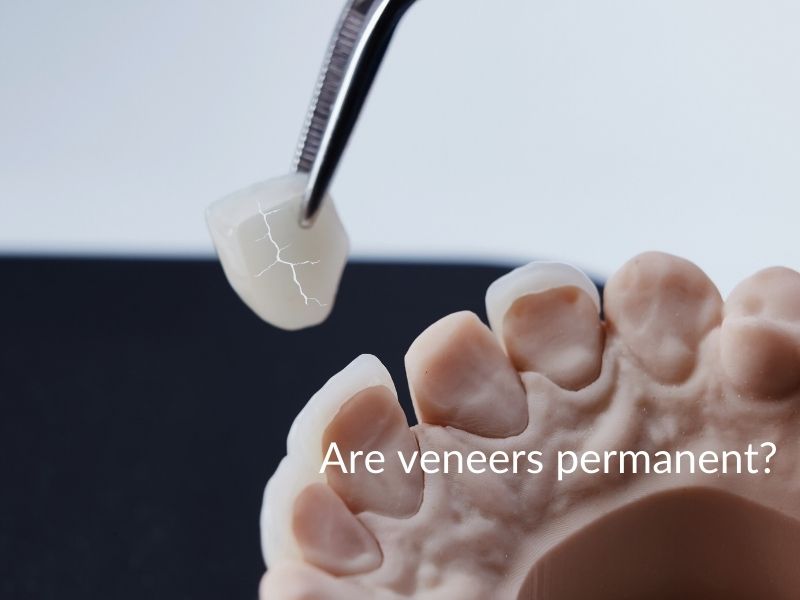
Dental veneers are thin layers bonded to the front of teeth for several reasons in esthetic dentistry. Porcelain and resin composite are types of veneers materials. They are normally used for esthetic corrections of fractured, cracked, spaced, or stained teeth. Theyalso improve the color, shape, size or length of teeth and esthetic appearance of their smile. Well, are dental veneers long-lsting?
Are veneers permanent?
No, dental veneers are not a permanent solution for the teeth.
This holds particularly for porcelain veneers that is farther extended, depending on how well the client takes care of it. While plane veneers normally lasts for an average of 6-7 years depending on the usage and are more susceptable to staining and breakage due to their porous nature and higher brittleness. Porcelain veneer is the most durable type due to its high strength, hardness combined with resistance to staining.
The porcelain is more translucent than the composite resin and does not contain the pores which can cause the material to stain or wear faster. From a scientific perspective, the kind of structure that porcelain veneers possess and the strength that they offer are some of the reasons why they will last longer than most other types will. However it is important to remember that there are many factors that affect the durability and permanence of teeth veneers. Here are some of them.
Factors influencing the longevity of dental veneers
Dental veneers are extremely thin shells, typically placed on the front surface of the teeth, making them susceptible to breakage. They require meticulous care and attention due to their delicate nature. Here are some tips on what affects the lifespan of your veneers and how to extend the life of your veneers (BioMed Central, MDPI)
Type of Veneer
We have provided information on this above. Porcelain veneers are more durable than composite veneers due to their structure, they do not stain as easily and they last longer.
Certified and High-Quality Materials
The quality of veneers is in the kind of material employed in the process of veneering as well as quality of work executed. Original certified veneers are produced from high-quality materials and they are more effective and durable than other ones.
Avoiding Hard Objects
Examples of Hard Objects: Veneers can be easily damaged by ice, nuts, pen caps, hard candies, or any other hard substances taken in the mouth. Patient should never use the teeth to open any container or to cut something with a blade since it is damaging to the teeth.
Teeth Grinding (Bruxism)
Night grinding is a dangerous problem that harms veneers tremendously. Thus it should be avoided at all costs. For them, it is better to wear a nightguard since this protecst their teeth from more pressure and usage at night.
Regular Dental Care and Visits
It would be a good idea to have routine check-ups of your teeth and follow-up of veneers in the country you are in. This road map should not be compromised not only for veneer care but also for all kinds of dental problems. One must use mouthwash, dental floss and brush the teeth in the correct manner and without negligence. Such practice assists in the health of the natural teeth and gum tissue that in turn support the veneer.
Experience of the Dentist
Patients must seek the services of an experienced dentist, because expertise determines how long the veneers will last. Appropriate placing and cementation provide veneers with a good hold and makes them durable.
Smoking and Alcohol Consumption
Smoking should be avoided because it damages the adhesive used to place the veneers, negatively affects the immune system, delays healing, gum diseases, reduces blood circulation and stains the teeth like alchol.
Avoiding Trauma
Contact sport or activities that involve the head and face need protection hence the use of helmets. Wearing of mouth guards is useful in protecting the veneers and the natural teeth from any form of damage.
Natural Teeth and Root Health
It is essential for the underlying natural teeth and roots to be healthy for veneers to be placed on them.
Medications and Chemicals
Medications cause staining on teeth by the time. Morever, medications and chemicals like antiallergic drugs, anti-depressants, anti-anxiety drugs, antihistamines, decongestants, anti-parkinson drugs, and anti-smoking drugs or medication causing dryness of mouth may affect the veneer in the sense that the gums shrink away from the teeth causing the veneers to be ineffective. Any medicines, prescription or over the counter, should be disclosed to your dentist to reduce risks where possible.
Emax veneers: The long-lasting choice for a durable smile
Emax veneers which are made from lithium disilicate glass-ceramic are generally more resistant to wear than the normal porcelain veneers. A research study carried out in the Journal of prosthodontics has further revealed that while ensuring the clinical survival rate of up to 20 years, Emax veneers are more resistant to chipping and cracking owing to their strength.
The more conventional porcelain veneer has a lifespan of between ten to fifteen years on average. The material used for Emax veneers, lithium disilicate, has better fracture strength as well as wear resistance compared to the materials used in porcelain veneers. Also, it is good to know that Emax veneers involve little preparation of the teeth thus the longevity of the veneers since the natural tooth has not been altered much.
Click to read our article 'Hollywood Smile vs Veneers'
With our guaranteed treatments, we are always here for you.
Don’t hesitate to contact us, We will be happy to help anytime.



